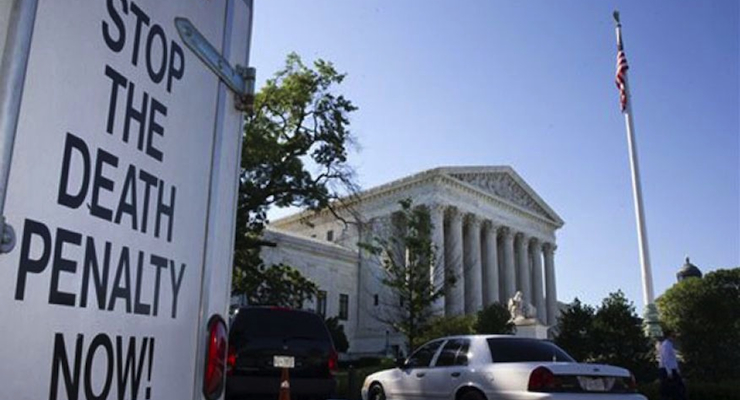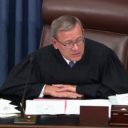

June 29, 2015: A vehicle parked near the Supreme Court in Washington, has signage that says “Stop the death penalty.” (Photo: AP)
The Supreme Court Monday upheld the use of a lethal injection drug, even as two dissenting liberal justices declared it’s “highly likely” the death penalty itself is unconstitutional. The 5-4 decision involved a case out of Oklahoma where the sedative midazolam can be used in executions without violating the Eighth Amendment prohibition on cruel and unusual punishment.
The drug was used in executions in Arizona, Ohio and Oklahoma in 2014, but was targeted by opponents of the death penalty when it took longer than expected to put inmates into a coma-like sleep. Justice Samuel Alito, writing for the majority, held the allegation that the drug could not be used effectively as a sedative in executions was simply speculative. Alito painstakingly addressed five key arguments made by the opponents of the death penalty, rejecting each one individually yet taking specific issue with the final argument.
Alito railed against the dissent, which was authored by Justice Sonia Sotomayor.
“Finally, we find it appropriate to respond to the principal dissent’s groundless suggestion that our decision is tantamount to allowing prisoners to be “drawn and quartered, slowly tortured to death, or actually burned at the stake,” Justice Alito wrote. “That is simply not true, and the principal dissent’s resort to this outlandish rhetoric reveals the weakness of its legal arguments.”
“For these reasons, the judgment of the Court of Appeals for the Tenth Circuit is affirmed.”
In dissent, Justice Sonia Sotomayor said, “Under the court’s new rule, it would not matter whether the state intended to use midazolam, or instead to have petitioners drawn and quartered, slowly tortured to death, or actually burned at the stake.”
In a separate dissent, Justice Stephen Breyer said the time has come for the court to debate whether the death penalty itself is constitutional. Justice Ruth Bader Ginsburg joined Breyer’s opinion, marking the first time two justices declared — let alone in a dissent — that it was “highly likely” to be unconstitutional.
However, while Alito said death penalty opponents are waging a “guerrilla war” against executions — specifically by working to limit the supply of more effective drugs — Justices Antonin Scalia and Clarence Thomas called out the historical inaccuracies against the anti-capital punishment argument.
“Welcome to Groundhog Day. The scene is familiar: Petitioners, sentenced to die for the crimes they committed (including, in the case of one petitioner since put to death, raping and murdering an 11–month-old baby), come before this Court asking us to nullify their sentences as ‘cruel and unusual’ under the Eighth Amendment,” Justice Antonin Scalia joined by Justice Clarence Thomas wrote. “They rely on this provision because it is the only provision they can rely on.”
“The response is also familiar: A vocal minority of the Court, waving over their heads a ream of the most recent abolitionist studies (a superabundant genre) as though they have discovered the lost folios of Shakespeare, insist that now, at long last, the death penalty must be abolished for good. Mind you, not once in the history of the American Republic has this Court ever suggested the death penalty is categorically impermissible. The reason is obvious: It is impossible to hold unconstitutional that which the Constitution explicitly contemplates. The Fifth Amendment provides that ‘[n]o person shall be held to answer for a capital . . . crime, unless on a presentment or indictment of a Grand Jury,’ and that no person shall be ‘deprived of life . . . without due process of law.'”







